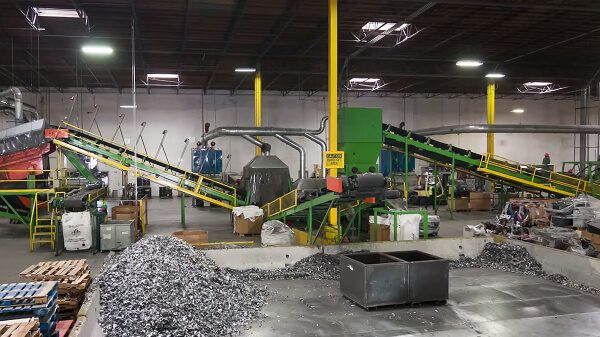
What can business do to decrease their inputs into the growing e-waste stream, and which solutions are best for business? Here are just a few of the most important steps your company can take.
1. Invest in a circular economy approach.
If you aren’t familiar with the term circular economy you probably should be. It’s a concept taking the corporate world by storm even as it penetrates the academic and social science sectors of society.
The circular economy is a sustainable approach to economic principles with an eye toward decreasing dependence on finite resources and addressing the crisis situations currently taking place in our environment. This means more electronics recycling as well as reuse and repair as sustainable options to end-of-life disposal.
Corporations are embracing the circular economy approach by encouraging consumers to do more with less and even decreasing the amount of waste for their own manufacturing and productions methods. For instance, Dutch-based Unilever’s Comprehensive Zero-Non-Waste-to-Landfill Program has allowed 100% of its branches to achieve zero waste.
2. Avoid the tech graveyard syndrome.
A brief admonition that could apply to either to home or office – avoid the tech graveyard syndrome. Tech graveyards are those reflections of our habitual tendencies to put off or delay responsibly disposing our electronic waste, either because we we do not know what to do with it or because we are too busy to take action.
E-waste stored in the basement of your home or office is still e-waste that could be safely recycled. Not to mention the fact that, depending on the amount of e-waste you’re storing, your e-waste likely contains valuable assets, such as gold and silver, just collecting dust. Take the time to devise a system that ensures your electronic waste is disposed of quickly to avoid the tech graveyard.
3. Buy from SMM Electronics Challenge participants.
The SMM Electronics Challenge announced this year that its effort in conjunction with hundreds of electronics manufacturers and retailers amounted to taking over 112,000 cars off the road. That’s a significant contribution from companies whose products contribute the most to the e-waste crisis.
The SMM Challenge, the brain child of the EPA entices electronics manufacturing companies to offer programs that get electronics into the recycling stream and out of the waste stream. Participants diverted over 200,000 tons of electronics from landfills, and some manufacturers are in the business of designing 100% recyclable electronics.
Purchasing from these SMM Challenge participants can be a responsible way to address e-waste management solutions for your business or for your home.
4. Set Asset Value Recovery goals.
Today’s world is full of ways to turn e-waste into valuable resources. Urban mining is fast becoming a smart way to ensure that not all e-waste goes to waste, so to speak. It means recovery of the most valuable components of electronics including gold, platinum, silver and other precious rare metals and minerals which can be used to manufacture new products without disturbing natural resources.
Companies can cash in on the asset recovery value of their e-waste by factoring in the amount of money that could be saved by reusing certain components of end-of-life electronics. Some recyclers may offer this as a service and help ensure that asset recovery goes forward smoothly.
5. Comply with state and national e-waste regulations.
Today, 25 states include mandated legislation concerning e-waste recycling. That’s still only half of the nation. Nonetheless, compliance in these states and beyond is crucial for curbing the e-waste crisis.
Beyond the 25 states, a patchwork of regulations and certification requirements govern America’s approach to keeping e-waste and and other hazardous waste out of landfills. For instance, states without an e-waste recycling program or law in place may still prohibit disposing e-waste in landfills. Also, certain kinds of e-waste may especially be prohibited, such as cathode ray tube devices.
In addition to regulation concerning e-waste management, laws and regulations cerning data destruction and the proper handling of sensitive information may also actor in. These include HIPAA for medical and health records and the Fair and Accurate Credit Transaction Act (FACTA) for credit reports and other financial documents. When devising a e-waste management solution, be sure to consider any regulations that may apply.
6. Pay attention to data security management.
On the same topic, data security management is an essential consideration when it comes to managing e-waste. Data security is just as important after a electronic device is collected for recycling as it is during operation. This is because if data is not properly removed from a device, it can be retrieved even after the device trashed.
This means any company e-waste solution must include a plan for handling data security – whether that means working with a certified and trustworthy recycler or even going one step further and making sure that recycler can offer proof of secure electronics recycling.
7. Connect with a reliable recycler.
Last but not least is connecting with a reliable recycler. A partnership with a sustainable and well-certified recycler is essential for combating the inherent data security risks involved in IT asset disposal. It also makes sense to partner with a recycler that’s certified and has a proven track record of sustainable electronic waste recycling methods.
E-waste Management Solutions for Large and Small Businesses
Managing your e-waste is a very urgent and crucial aspect of managing your company. You’ll need to find way to responsibly dispose of your electronic devices as well as stay in compliance with state and local regulations. One of the best ways to find solutions for e-waste management is to partner with a reputable electronics recycler offering a variety of options – including all those mentioned here.